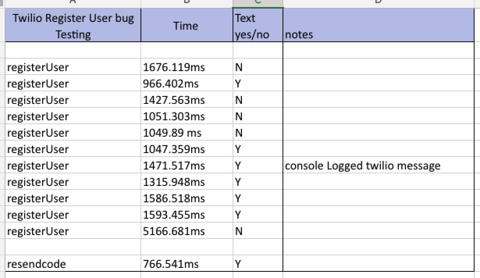Hi. We are using Twilio to validate a user’s phone number. We are using the HTTP module in NodeJS to make a request to Twilio to send a message. We have found that it successfully sends the message every time when our project is running in debug mode. When we deploy our mode the message did not send. We then through sheer luck found that adding a console log before the request is over results in the deployed code working about 75% of the time.
I understand this is referencing an external service, but the issue seems to be when the code is run in debug vs deploy.
We have solved a similar issue previously where a promise statement was not being resolved causing a difference in the debug and deployed behavior. Although this seems to not be the case in our code. Previous Support Topic.
APP ID: DD9FC30D-3A6F-AB4C-FF9C-24DC92E73100
Below is a slightly simplified version of the relevant code.
/**
* @param {String} firstName
* @param {String} lastName
* @param {String} phone
*/
async registerUser(firstName, lastName, phone) {
var params = {firstName, lastName, phone, email, profilePic, churchId, build};
params = UserSupport.validate_registry_params(params);
var user = await UserSupport.get_user_by_phone(params.phone);
if (user) {
user = await update_user(user, params);
} else {
user = await add_user(params, 1);
}
if (user.churchId) {
await resolve_users_membership(user.userId, user.churchId)
}
// THIS IS THE LOG THAT IMPROVE TEXT MESSAGE SUCCESS
console.log(JSON.stringify(user, null, 2))
// THIS CALLS THE TWILIO REQUEST
await sendTextCode(user.userId);
return get_user(user.userId);
}
const sendTextCode = function(userId) {
return get_user(userId, null, null, true)
.then(async (user) => {
let code = create_confirmation_code()
let msg = code + ' is your verification code.'
// sets the textcode to the user object for confirm phone
await Backendless.Data.of("Users").save({
"objectId": user.objectId,
"userId": user.userId,
"textCode": code
})
let phone= "+1" + user.phone;
// THIS CALLS THE TWILIO REQUEST
await Twilio.sendSms(phone, msg);
return get_user(userId)
})
}
This is the Twilio request
'use strict'
var Config = require('./_Config_')
var https = require('https')
var Twilio = {};
Twilio.sendSms = function(phone2, msg) {
var options = {
host: 'api.twilio.com',
port: 443,
path: '/2010-04-01/Accounts/' + Config.config.twilio.accountSid + '/Messages.json',
method: 'POST',
headers: {
'Content-Type': 'application/x-www-form-urlencoded',
'Authorization': 'Basic ' + new Buffer.from(Config.twilio.accountSid + ':' + Config.twilio.authToken).toString('base64')
}
};
var postData = 'Body=' + msg + '&From=' + Config.config.twilio.numbers + '&To=' + phone2;
var req = https.request(options, function(res) {
res.setEncoding('utf8');
res.on('data', function(data) {
console.log('Message sent: ' + data);
});
res.on("error", err => {
console.log("Error: " + err.message);
});
});
req.write(postData)
req.end()
};
module.exports = {
Twilio
}

